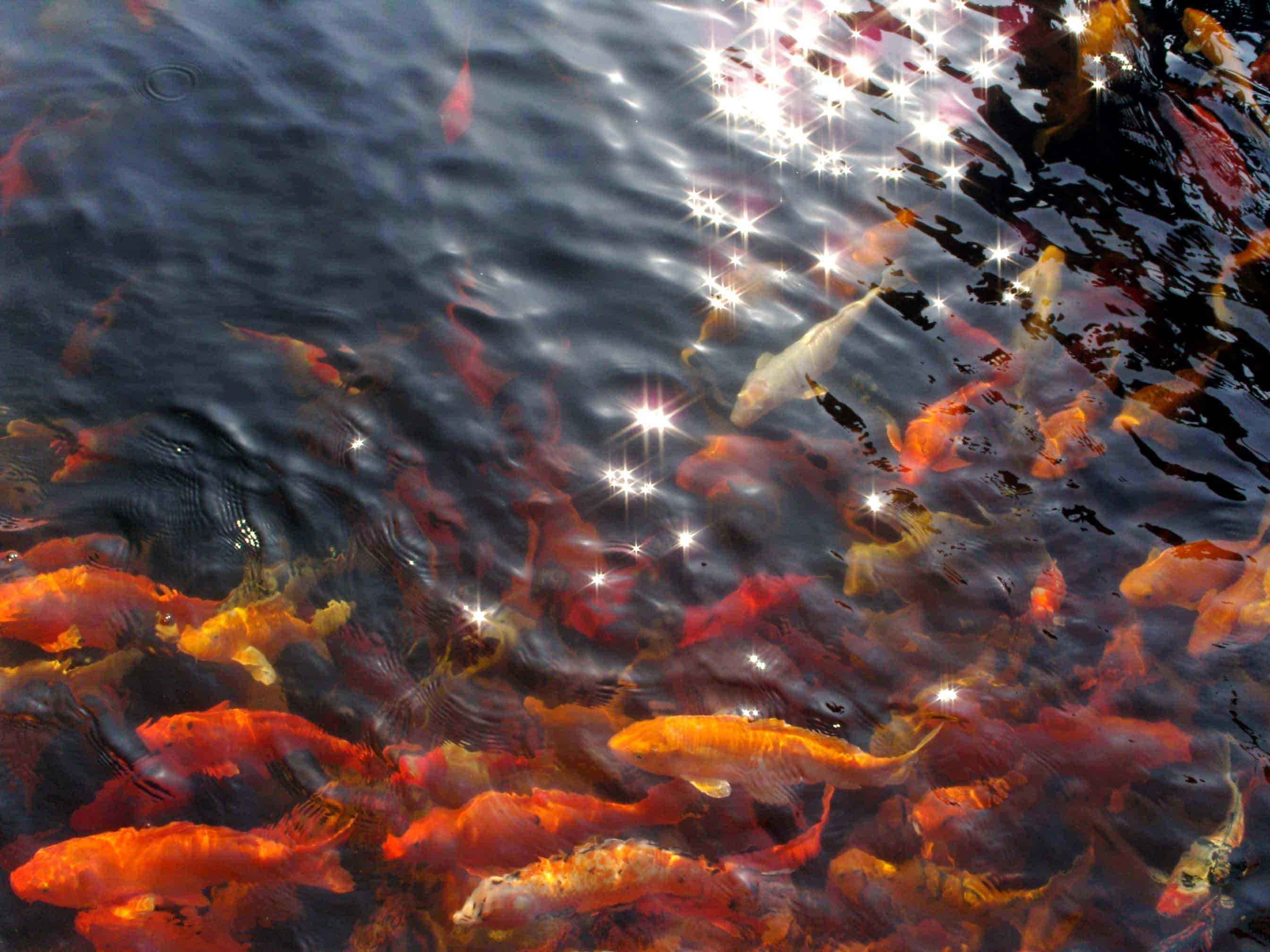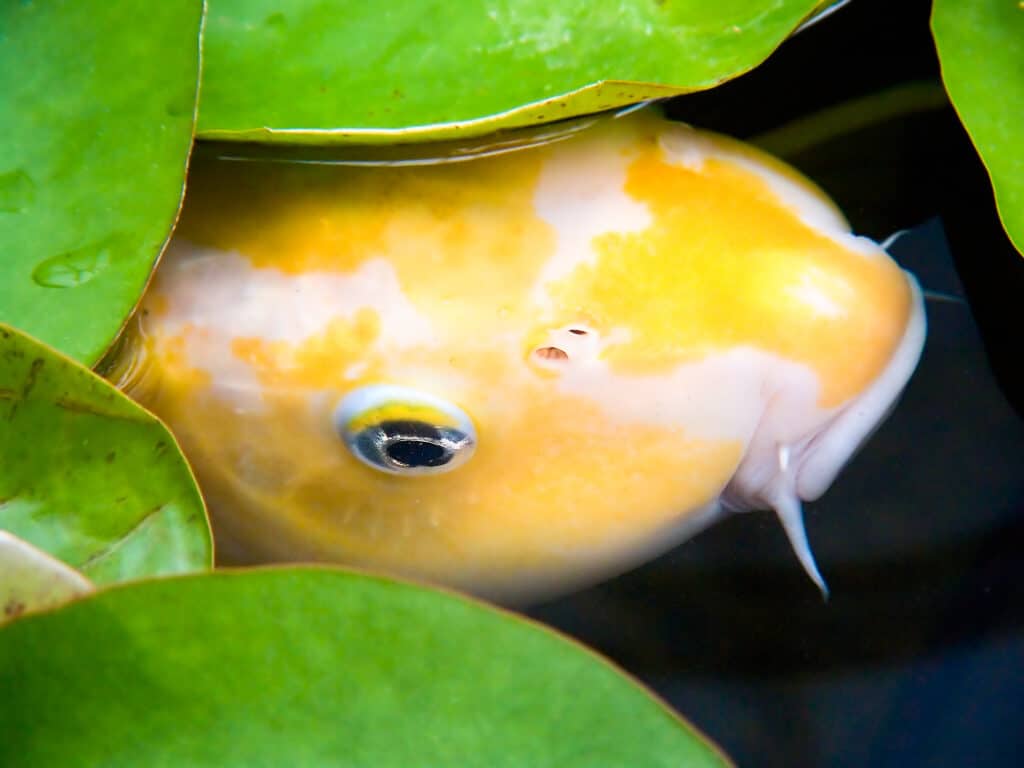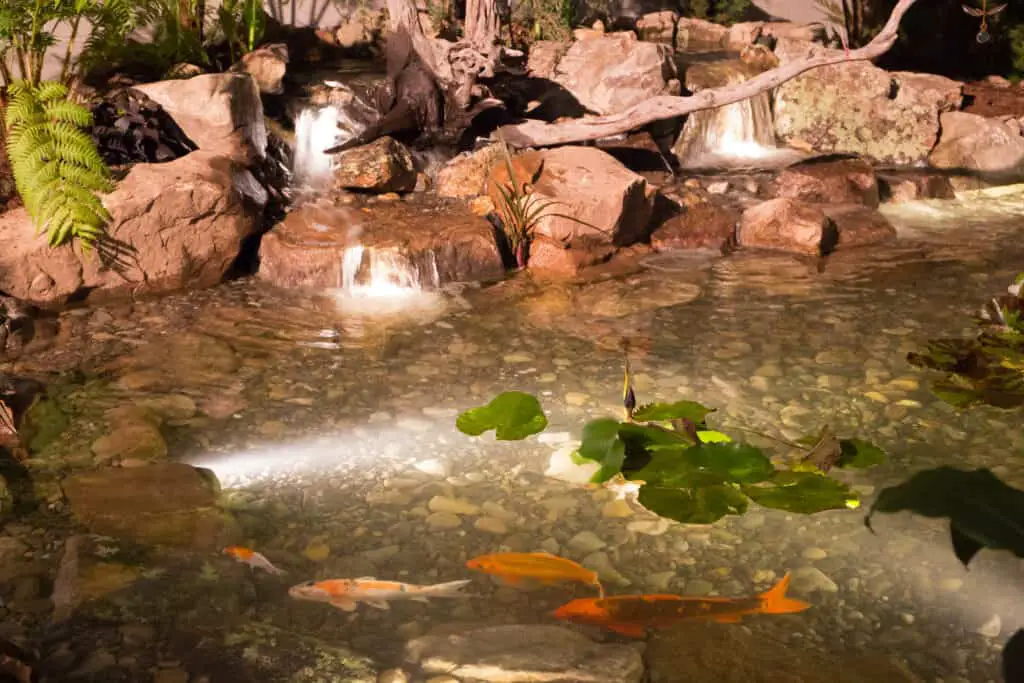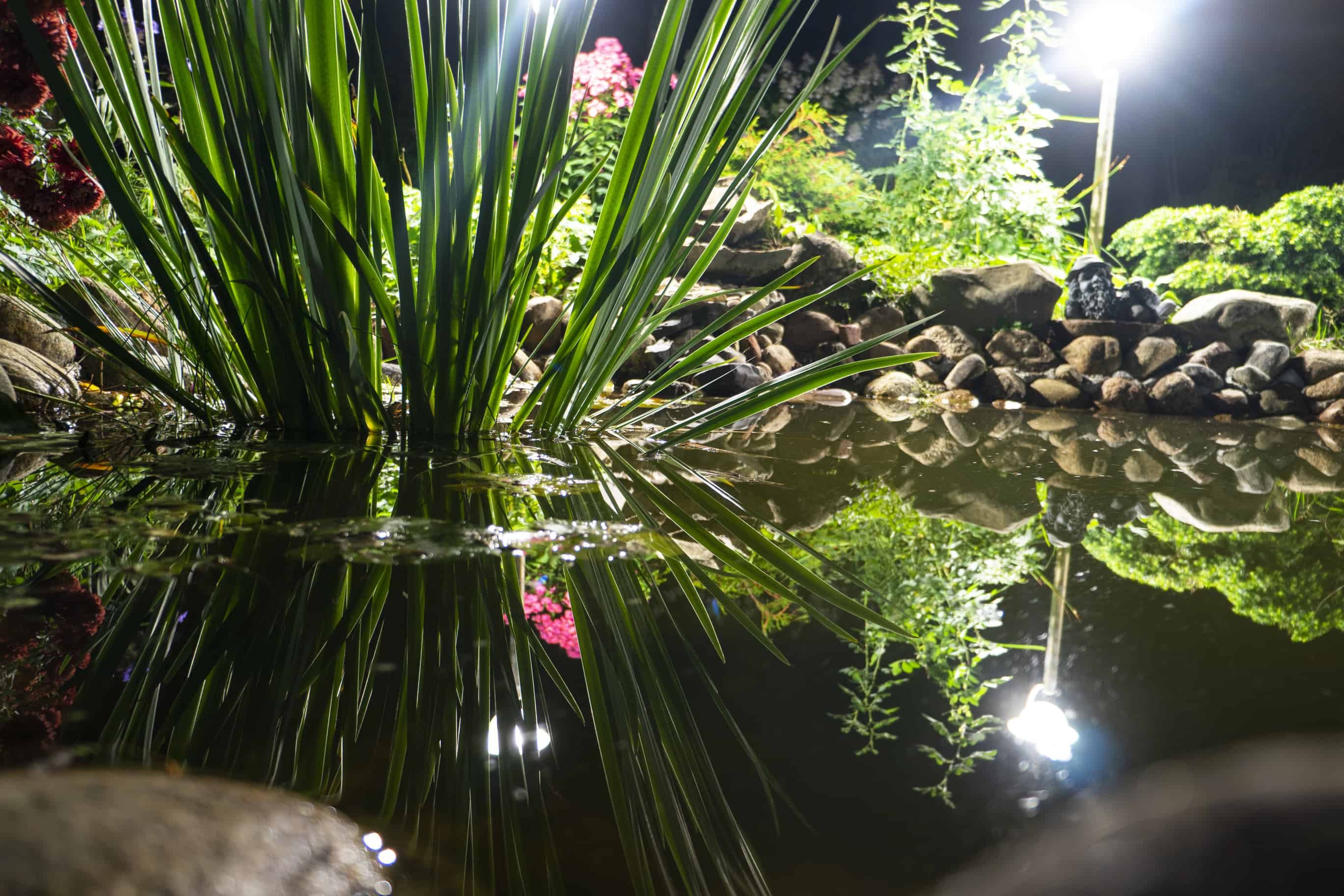
An important factor to consider before building a koi pond is light. Knowing how many hours of sunlight and how much shade the pond will get is important because koi fish are sensitive to light. Here, we discuss everything you need to know about koi fish and light.
Koi fish need about 8 hours of light and 8 hours of darkness daily to facilitate their natural circadian rhythms. Bright, indirect light is better than direct sunlight because koi fish can get sunburned. It is important to provide koi fish with plenty of shade to hide.
Indoor koi ponds need additional lighting overhead to ensure that the fish get enough light. When installing landscape lighting around an outdoor koi pond, you must keep a few critical factors in mind. While you can light your koi pond up beautifully at night, it can harm the fish!
Pro Tip: If you’re tired of wasting money and making costly mistakes on the koi-keeping hobby or are thinking about buying koi fish but don’t know where to start, I strongly suggest you check out this ebook. I recently read this ebook, and it contains SO much useful information, such as:
- 3 proven steps to identify koi fish diseases
- WARNING: 3 things you should NEVER do when it comes to caring for koi
- When to seek professional help when it comes to looking after your koi
Are Koi Fish Sensitive To Light?
Koi fish have excellent eyesight and can perceive light and darkness just like humans can. In the wild, koi fish live in rice paddies where they are exposed to sunlight during the day and darkness at night.
Koi fish need day and night light cycles to maintain their natural circadian rhythms. If you keep koi fish in an indoor aquarium, you must provide them with artificial overhead lighting. They need at least 8 hours of natural or artificial light every day.
Koi fish are sensitive to light because they cannot tolerate too much direct sunlight. They can only handle 5 or 6 hours of direct sunlight.
How Does Sunlight Affect Koi Fish?
Natural sunlight, in moderation, is great for koi fish. It helps keep them healthy, makes them look more beautiful, and provides them with food.
Natural light brings out koi fishes’ vivid colors. Natural sunlight makes the yellow and orange pigments that koi produce in their skin look more intense. If you had to take a bright yellow Yamabuki Ogon from an outdoor pond and put it into a tank in your home, you would quickly notice how the color fades.
A koi pond needs to get some natural sunlight, enabling the algae and plants growing in the pond to photosynthesize. They release oxygen into the water and provide a source of food for the koi.
The microorganisms living in the pond take in vitamin D from the sun, and when koi fish eat these little creatures, they get the vitamin D they need for growing strong bones.
UV radiation from the sun is dangerous to koi fish. Exposure to too much UV radiation can cause tumors and cancers in koi. Too much natural sunlight is not good for these fish!
Do Koi Ponds Need Shade?

Koi fish need a certain amount of natural sunlight to stay healthy, but too much sunlight affects them negatively. Like humans, koi fish can get sunburned if exposed to the hot summer sun for hours and hours. This is why providing koi fish with lots of shade is essential.
At a maximum, koi fish can only tolerate 5 or 6 hours of direct sunshine. They like to spend most of the day hiding in the shade under pond vegetation.
It would be best if you built a koi pond in an area of the garden that gets shade during the middle of the day. This is important for two reasons:
- When the sun bakes down on a koi pond, it causes the water temperature to rise. Warmer water doesn’t hold as much dissolved oxygen as cooler water. As the water heats up, the koi have less and less oxygen in the water to breathe.
- If a koi pond gets too much direct sunlight, it will cause the algae in the pond to grow very rapidly. This will make pond maintenance more intensive because you will have to scoop out excess algae regularly so that you can see your fish.
For these reasons, it is wise to build a koi pond in an area of the garden with tall trees or a wall to provide some shade during the hottest parts of the day.
If a koi pond is in an area exposed to direct sunlight all day, you should plant the pond with lots of water lilies and other aquatic vegetation that will provide the fish with some shade.
How Do Pond Lights Affect Koi?

Many people install underwater lights in their outdoor koi ponds to watch their fish at night. This is not a problem for koi unless the lights are left on all night. Koi fish need at least 8 hours of darkness at night, so a pond light must be switched off at around ten at night.
The issue is not so much that the light will keep fish awake at night. Koi fish rest during the day and at night. Koi fishes need a period of complete darkness to stay healthy.
Very bright pond lights can impede koi fishes’ vision. Imagine someone shining a torch directly into your eyes! It partially blinds the fish, and they can hurt themselves if they swim into sharp corners of objects or the side of the pond.
Another issue with underwater pond lights is that they confuse koi fishes’ sense of direction. Koi fish use the light from the sun to determine which way is up. A pond light makes them think the sun is shining from the side, so they swim at a strange angle.
Because of the hazards of underwater pond lights, many koi pond owners use landscape lighting to illuminate their koi pond at night. This is better for creating a more subtle moonlight effect in the water.
Should I Put Landscape Lighting Around My Koi Pond?

Installing landscape lights around your koi pond at strategic points can make it look beautiful at night. However, one must keep a couple of things in mind regarding landscape lighting around a koi pond.
Use low voltage floodlights to create broad swathes of light or use spotlights to create smaller pools of light. White lights show the koi fishes’ colors better than blue lights. Softer LED lights work very well.
Do not point spotlights directly into the pond. Instead, angle them on one side of the pond so that the beams of light reflect off the water’s surface. Indirect light is always better for koi than direct light. Illuminating the pond too brightly at night will make the fish more vulnerable to nocturnal predators, like raccoons. This will cause koi fish to experience high levels of stress.
Should I Put Decorative Lights In A Koi Pond?
LED Lights are waterproof, so there are many different types of decorative lights for fishponds available on the market. Some are colorful, and some can flash or twinkle like Christmas lights.
Decorative LED lights are safe to use in a koi pond. Koi ponds that have a fountain or waterfall look fantastic when you use LED lights to illuminate them.
As long as you do not forget to switch the lights off by ten at night, the decorative lights should not cause any issues for your koi.
Can Koi Fish Get Sun Burned? And What Does Sunburn On Koi Look Like?


During the summer, koi fish are particularly susceptible to catching a sunburn, especially if the pond does not get enough shade or is not deep enough.
Koi fish are covered in a slimy layer of mucus that protects their skin and scales from UV rays. This protective layer of slime is thicker in some areas, like the gills, and thinner in other areas. Therefore, it does not provide 100% protection from the sun!
White koi and lighter-colored varieties are the most at risk for sun damage because their skin does not have any melanin to protect it.
When koi fish get a minor sunburn, you will notice a light pink rash, often on fishes’ backs near their dorsal fins. The burned area feels warm to the touch and may be slightly raised from swelling.
Fish with minor sunburns behave differently. They are far less active and do not feed as voraciously. You may notice the fish staying in the deepest part of the pond where the water is coolest.
A moderate sunburn on a koi fish looks like a deep red patch on the fish’s back. The slime coating may appear dry and flakey. If you treat sunburn quickly enough, the koi can regenerate the protective slime layer.
However, if a moderate sunburn is left untreated, the burned spot can turn into a lesion, and the damage to the fish’s body will worsen.
A major sunburn is life-threatening to a koi fish. When a koi fish gets a severe sunburn, the slime coating is destroyed, and lesions turn into blisters and ulcers. Secondary infections can set in, quickly killing the koi.
How To Treat A Sunburned Koi Fish
As soon as you notice that one of your koi has a sunburn, you need to act! The sooner you treat the wound; the more likely the fish will recover.
Minor sunburns can be treated by providing the fish with ample shade. Place a hollow log or a PVC pipe in the pond for the fish to hide.
Feed high-quality koi food to give the fish the nutrition they need to recover. If the water is hotter than 75°F, do a partial water change to decrease the pond’s temperature.
Moderate to severe sunburns require more specialized care. You may need to quarantine a fish to treat them with antibiotics or a medicated dip. Keep the fish in a shady spot and monitor them for a few days. If you do not see improvement in 2 or 3 days, you should consult a vet familiar with treating koi fish.
How To Prevent Koi Fish From Getting Sun Burned
It is far better to take measures to prevent your koi fish from sunburn than to treat suffering fish. The following ways can protect koi fish from getting a sunburn:
- Build a koi pond deeper than 4 feet. Sunlight and UV rays penetrate shallow bodies of water more easily. Make sure your koi fish can hide from the sun in the cooler depths of the pond during the heat of the day.
- Provide lots of shade for koi fish. Put some structure into the pond so that the fish have dark places to hind from the sun. Hollow logs or a PVC pipe provide the perfect shelter for koi. Also, plant lots of aquatic vegetation in the pond. Plants with large leaves, like water lilies, can provide the shade that koi fish need. About 50 to 70% of the pond’s surface can be covered with plants.
- During summer, when the pond water heats up beyond 75°F, do a partial water change regularly. This will help to cool the pond down and prevent fish from getting sunburned.
- Ensure the pond is well aerated with a waterfall, fountain, or air pump. If the dissolved oxygen level in the water drops too low, koi fish will hang around the water’s surface, gasping for air. This makes them extremely vulnerable to getting sunburned.
Conclusion
There are a few things to keep in mind regarding koi fish and light. Ensuring they get enough natural sunlight to maintain their bright colors and circadian rhythms is important, but so is ensuring they do not get too much direct sunlight!
Adding an underwater pond light or landscape lighting around a koi pond is a great way to bring out the pond’s beauty at night. However, you must take care not to install lights that are too bright or shine directly into the pond. It can disorientate the fish, making them more vulnerable to predators.
Resources
https://www.koiphen.com/forums/showthread.php?154126-Lighting-and-how-it-affects-koi

